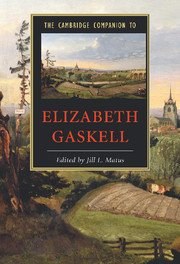Book contents
- Frontmatter
- 1 Introduction
- 2 The life and letters of E. C. Gaskell
- 3 Mary Barton and North and South
- 4 Cranford and Ruth
- 5 Elizabeth Gaskell’s The Life of Charlotte Brontë
- 6 Sylvia’s Lovers and other historical fiction
- 7 Cousin Phillis, Wives and Daughters, and modernity
- 8 Elizabeth Gaskell’s shorter pieces
- 9 Gaskell, gender, and the family
- 10 Elizabeth Gaskell and social transformation
- 11 Unitarian dissent
- 12 Gaskell then and now
- Guide to further reading
- Index
- Series List
11 - Unitarian dissent
Published online by Cambridge University Press: 28 May 2007
- Frontmatter
- 1 Introduction
- 2 The life and letters of E. C. Gaskell
- 3 Mary Barton and North and South
- 4 Cranford and Ruth
- 5 Elizabeth Gaskell’s The Life of Charlotte Brontë
- 6 Sylvia’s Lovers and other historical fiction
- 7 Cousin Phillis, Wives and Daughters, and modernity
- 8 Elizabeth Gaskell’s shorter pieces
- 9 Gaskell, gender, and the family
- 10 Elizabeth Gaskell and social transformation
- 11 Unitarian dissent
- 12 Gaskell then and now
- Guide to further reading
- Index
- Series List
Summary
“However I told him what I did believe - (more I suppose what would be called Arian than Humanitarian).”
Elizabeth Gaskell to Charles Eliot Norton (1861)In 325 the Council of Nicaea declared that God the Father, Son, and Holy Ghost exist as three equal persons in a divine unity. Dissenting Protestants ejected from the Church of England in 1662 for refusing to accept the authority of bishops retained this orthodox Trinitarian doctrine, but in the next century some followed Arius (c.256-336) in the belief that Christ was divine but inferior to God the Father. Others came to believe that Christ was only human, and were insultingly labeled Socinians after two sixteenth-century heretics. Although most anti-Trinitarians held that Christ was a divinely inspired guide and teacher, they were not regarded as Christians, even by other Dissenters. Between 1689 and 1813 denial of the Trinity was technically against the law of England. Unitarian polemics against other legal and political disabilities, and frequent support for French Revolutionary principles, caused many to be ostracized as dangerous radicals. In 1791 ''Church and King'' mobs destroyed the house, library, and papers in Birmingham of Joseph Priestley (1733-1804), famous scientist and leading Unitarian minister, and rioted in Manchester, not long before Elizabeth Gaskell's father arrived to teach in a new college there.
- Type
- Chapter
- Information
- The Cambridge Companion to Elizabeth Gaskell , pp. 164 - 177Publisher: Cambridge University PressPrint publication year: 2007
- 2
- Cited by

